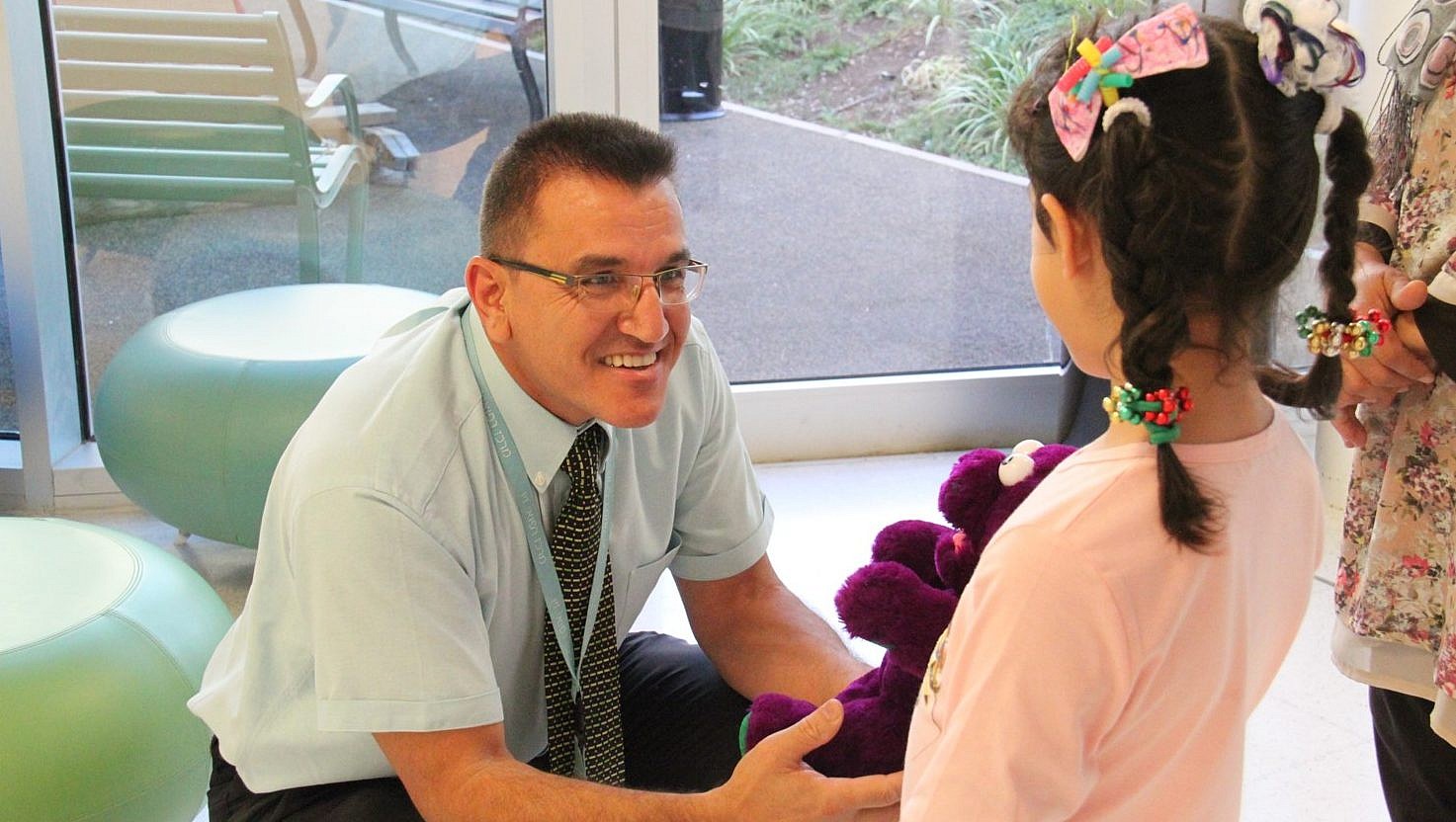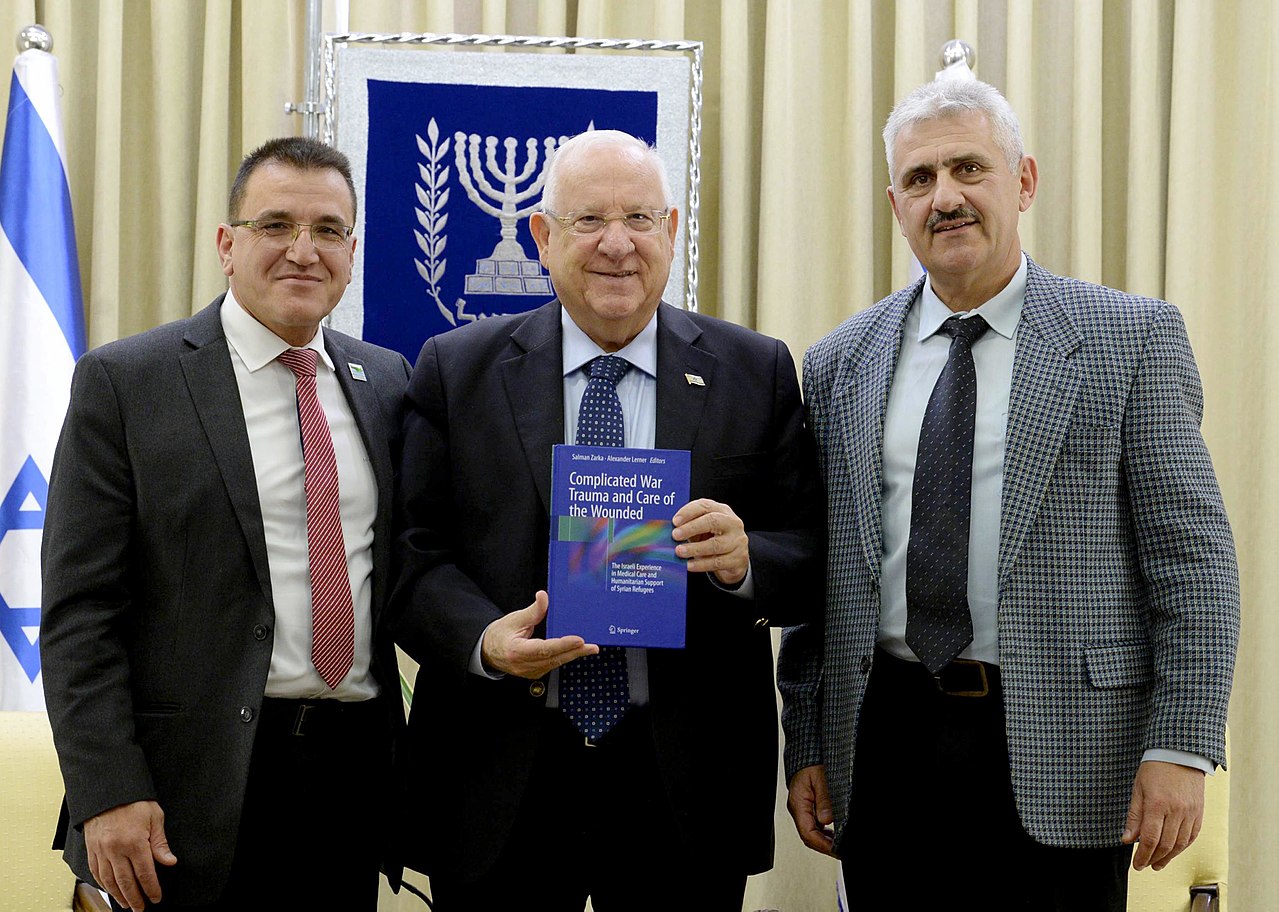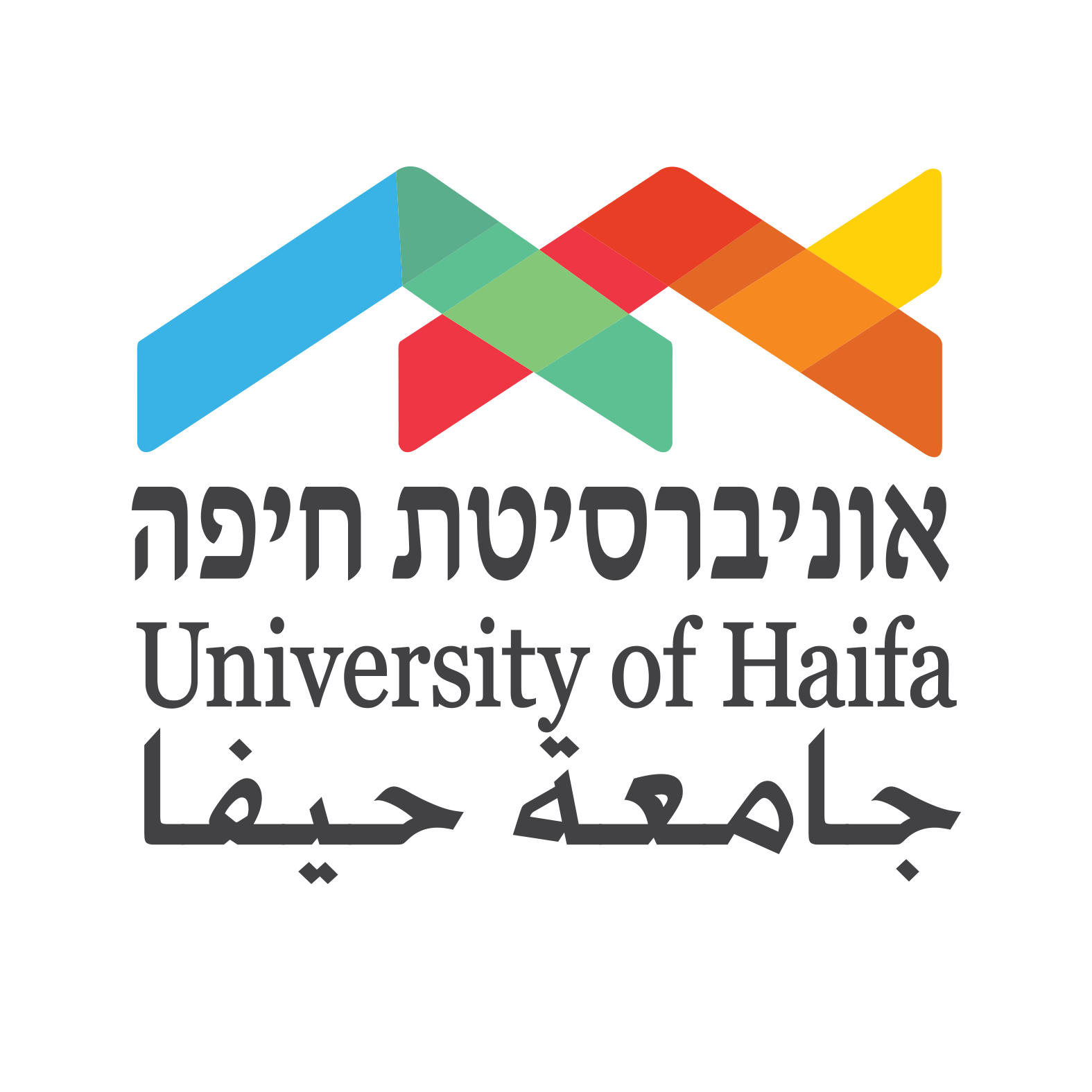 Saving Lives and Winning Hearts
Saving Lives and Winning Hearts
Meet Colonel (Res.) Dr. Salman Zarka, MD, MPH and MA
According to Dr. Salman Zarka, “Medicine could be a key
to peace in the region.” Dr. Salman Zarka, an internationally
renowned expert in public and military medicine, has the
proven track record and initiative to turn this vision into reality.
Dr. Salman Zarka, Director of Ziv Medical Center in Safed, speaks with a Syrian girl receiving medical treatment in Israel.
When refugees from the Syrian Civil War began arriving on Israel’s northern border seeking medical assistance, Dr. Zarka founded and commanded a field hospital for the treatment of wounded victims. The activities of the secret hospital in the Golan Heights, later dubbed ‘Operation Good Neighbor’, treated hundreds of people, young and old, civilian and military, with serious war injuries. In recognition of his outstanding efforts and commitment to the basic values of human dignity and the sanctity of life, Dr. Zarka was honored as one of the 14 torchbearers at Israel’s 71st Independence Day ceremony in Jerusalem.
Following a distinguished 25-year career as an IDF medical officer, Dr. Zarka accepted a position as the Director of Ziv Medical Center* in Safed. In addition, he serves as a senior lecturer at the School of Public Health at the University of Haifa and the Department of Military Medicine at Hebrew University of Jerusalem. He holds an MA degree in political science and national security studies from UofH.
What are some of the challenges you faced as the commander of the field hospital on the Syrian border?
 Medical humanitarian aid is typically administered on the territory of the disaster-stricken country. In our case, we were providing Syrian nationals with humanitarian aid in Israel, which raised complex ethical dilemmas regarding standards for patient care and the treatment of wounded enemy soldiers. The core humanitarian standard of aid seeks to save lives, using limited resources. For example, at a field hospital, cases of severe limb injury could end with amputation. In Israel, however, where the medical system is committed to providing the highest quality of care and maximizing quality of life, our standard practice uses all available resources and makes every effort to save the wounded limb. We decided to treat Syrian casualties with the same level of care afforded to Israelis. Based on these actual cases, I have published several papers and have co-authored a book devoted to the ethics of humanitarian aid and field hospital administration during mass casualty events. My experiences at the field hospital have strengthened my mission as a physician to alleviate suffering, protect life and health, and restore respect for fundamental human rights.
Medical humanitarian aid is typically administered on the territory of the disaster-stricken country. In our case, we were providing Syrian nationals with humanitarian aid in Israel, which raised complex ethical dilemmas regarding standards for patient care and the treatment of wounded enemy soldiers. The core humanitarian standard of aid seeks to save lives, using limited resources. For example, at a field hospital, cases of severe limb injury could end with amputation. In Israel, however, where the medical system is committed to providing the highest quality of care and maximizing quality of life, our standard practice uses all available resources and makes every effort to save the wounded limb. We decided to treat Syrian casualties with the same level of care afforded to Israelis. Based on these actual cases, I have published several papers and have co-authored a book devoted to the ethics of humanitarian aid and field hospital administration during mass casualty events. My experiences at the field hospital have strengthened my mission as a physician to alleviate suffering, protect life and health, and restore respect for fundamental human rights.
Israeli President Reuven Rivlin (center) receives a copy of
Complicated War Trauma and Care of the Wounded, from
Dr. Salman Zarka and co-author Prof. Alexander Lerner (left),
Director of the Orthopedic Department at Ziv Medical Center.
Tell us about the course you teach at the School of Public Health.
I have been teaching at the University since 2006. I teach an elective course in the Master of Public Health (MPH) Program on health issues of vulnerable populations, including ethnic minorities (Arabs) and army populations, which shed light on disease prevention, promotion of patient care, intelligent decision-making and high-quality administration. We also explore environmental factors such as overexposure to dangerous materials and military vaccinations, alongside relevant cultural and socioeconomic factors that may impact each case.
The best part of teaching is meeting motivated students, and witnessing those ‘eureka’ moments igniting a sparkle in their eyes. I especially enjoy being part of a distinguished faculty, among them Prof. Shai Linn and Prof. Manfred Green, who have been my guiding lights in this field.
What inspired you to complete a thesis track MA in political science and national security at the University of Haifa?
Policy and governance has a direct impact on public health and medical treatment, so it is of great interest for me. I chose to write my thesis paper on issues that are close to my heart. With the supervision of Prof. Gabriel Ben Dor, head of the National Security Studies Program, my thesis studied the military service over a 15-year period of young Druze men from remote villages in the Galilee with their peers from the Carmel mountain region (in closer proximity to large urban centers).
We found that volunteering levels for combat units were highest among Druze soldiers from villages in the Galilee, compared to soldiers from the Carmel region. In fact, we found that across Israel, young men from community settlements and kibbutzim volunteer in higher numbers for combat units in comparison with those from major cities. A related study found overall higher conscription levels of Druze men to combat units in comparison with their Jewish peers.
What was it like to be a torchbearer at the Independence Day ceremony?
I come from a large Druze family, and it was a great honor for me to light the torch on behalf of my community. This torch is also a tribute to all civilian and military medical teams delivering advanced quality patient care to all Israelis. In honoring me, the State also honored the nurses and doctors who displayed high ethical standards and provided life-saving medical treatment to Syrians in the military hospital on the border and in the medical centers in the north.
What vision or motto has guided you throughout your career?
I believe in the power of positive thinking and continual self-improvement. Throughout my career, I have been very motivated by the belief that with hard work positive change is possible. I guess this motto runs in the family. My wife Rawda, who is also a University of Haifa alum, is a social worker and couples therapist who works with bereaved families of IDF soldiers. Working with incredibly devoted medical teams at Ziv Medical Center, my goal is to raise the level of healthcare for residents of the Galilee.
____________________________________________________________________________________________________________________________________
*Ziv Medical Center is a public hospital providing medical care to residents of northern Israel, IDF soldiers and UN peacekeepers serving in the region.
More Inspiring Alumnus Stories:

